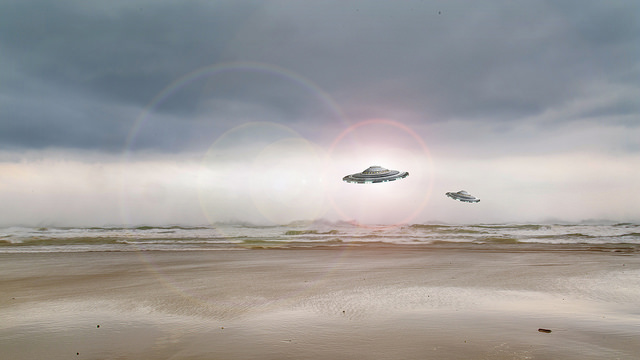
Originally posted April 12, 2018.
Throughout history, human beings have been enthralled by the idea of the paranormal. While we might think that UFOs and ghosts belong to a distant and obscure dimension, social circumstances help to shape how we envision the supernatural. In a recent interview with New York Magazine, sociologist Joseph O. Baker describes the social aspects of Americans’ beliefs about UFOs.
Baker argues that pop culture shapes our understandings of aliens. In the 1950s and 1960s, pop culture imagined aliens in humanoid form, typically as very attractive Swedish blonde types with shining eyes. By the 1970s and 1980s, the abductor narrative took hold and extraterrestrials were represented as the now iconic image of the little gray abductor — small, grey-skinned life-forms with huge hairless heads and large black eyes. Baker posits that one of the main causes of UFOs’ heightened popularity during this time was the extreme distrust of the government following incidents such as Watergate. Baker elaborates,
“I think there is something to be said for a lack of faith in government and institutions in that era, and that coincided with UFOs’ rise in popularity. The lack of trust in the government, and the idea that the government knows something about this — those two things went together, and you can see it in the public reaction post-Vietnam, to Watergate, all that stuff.”
While the individual characteristics of “believers” are hard to determine, survey evidence suggests that men and people from low-income backgrounds are more likely to believe in the existence of alien life. Baker says that believing is also dependent upon religious participation rather than education or income. In his words,
“One of the other strongest predictors is not participating as strongly in forms of organized religion. In some sense, there’s a bit of a clue there about what’s going on with belief — it’s providing an alternative belief system. If you look at religious-service attendance, there will be a strong negative effect there for belief in UFOs.”
Baker’s research indicates that social circumstances influence belief in extraterrestrial beings. In short, these social factors help to shape whether you are a Mulder or a Scully. Believing in UFOs goes beyond abductions and encounters of the Third Kind. In the absence of trust in government and religious institutions, UFOs represent an appealing and mysterious alternative belief system.

Comments 2
Virginia R. Mysliwiec — August 18, 2023
The intersection of pop culture and sociology is truly fascinating, and "Best of 2018: The Sociology Behind the X-Files" delves deep into this captivating relationship. Exploring the themes, characters, and narratives of a beloved series like The X-Files through a sociological lens provides unique insights into the societal currents that shaped its creation and reception. Here I would like to suggest https://trendingnewsbuzz.com/video-games-and-important-social-issues/ article where you can read about the most intriguing video games and social issues that the world is facing in present days.
gloriagloriawolff — September 19, 2023
A fascinating dive into the sociological aspects of a timeless classic! The X-Files has always been more than just a show; it's a cultural phenomenon that explores the depths of human beliefs and societal dynamics. For those intrigued by sociological analyses, I recommend checking out this thought-provoking article https://www.theolivepress.es/spain-news/2023/09/04/exploring-the-differences-in-abortion-legalization-in-spain-and-the-united-states/. It delves into another complex social issue, exploring the differences in abortion legalization between Spain and the United States.